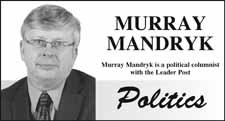Is it asking too much to have one honest set of books telling us how our tax dollars are spent?
This should be rudimentary to governing. Yet - notwithstanding withstanding the never-ending commitment to "accountability" and "transparency" we hear from our politicians - it's something we still don't have in Saskatchewan.
The Saskatchewan government continues to operate from two sets of books.
It does offer a "summary finance statement" giving the whole picture, but that's not the primary set of books it works from. Instead, the government operates and communicates from the "general revenue fund" (GRF) budget that just tells us about the taxes and royalties collected versus the department spending without offering a complete picture of Crown and overall debt, Crown dividend transfers fiscal stabilization funds and whether we actually have a surplus or a deficit.
So why can't our government just operate from one, honest summary financial statement that tells us the whole story?
That question has again been raised in the wake of Opposition Cam Broten calling for Finance Minister Ken Krawetz's resignation over the latest Provincial Auditor condemnation that basically calls Krawetz's 2012-13 GRF budget dishonest.
To better understand, it's helpful to understand a couple things.
For starters, finance ministers do not - under any circumstances - ever resign. Not even acting Provincial Auditor Judy Ferguson's "adverse" opinion that Krawetz actually had a $580-million deficit budget last year _ not the $58-million surplus he claimed - is grounds for resignation.
But wouldn't an Auditor saying the budget is false be reason for firing the finance minister? Well, not when you have actually allowed finance ministers to keep two sets of books for years.
All previous governments including the NDP government played many of the same games, relying on Crown corporation dividend payments or "fiscal stabilization funds" - money left over from previous surpluses - to balance the annual budget. It was this very tactics that allowed the NDP government to claim it presented "14 consecutive balanced budgets" when it really did no such thing.
In fact, it can be argued that the NDP government was actually even worse than the Saskatchewan Party government when it came to giving the whole picture. The NDP didn't even go through the pretence of presenting a "summary financial statement" at budget time until 2004. And until 2004, its fiscal stabilization fund wasn't even a real account with real funds. It was jut a paper shuffle.
Unfortunately, Krawetz and the Sask. Party have kept up most of the deceitful budgeting practices of the NDP and have added a few wrinkles of his own. Those additional wrinkles entered the realm of deceit and are why the Provincial Auditor - for the first time in history - issued her warning that Krawetz's 2012-13 GRF budget can't be believed.
Like the NDP finance ministers, Krawetz did not properly account for total debt and pension liabilities. But he took matters a step further by not properly booking the costs of building hospitals and schools, so that last year's books looked $638-million-plus better than it actually was.
This takes us back to the bigger question: Why can't we just have a little honesty in government financing with a March budget each year that accurately reflects how much we take in and how much we spend?
Well, the short answer to this is that it's much better for governments to have two sets of books that allows it claim its operational budget is balanced when it really is not. That way, it's easier to justify overspending that buys votes while downplaying revenue losses that sometimes suggests a government isn't really doing a great job of running things.
Like the NDP, this is what Krawetz has done although he has taken it one step further to accomplish that goal
In short, completely honest accounting in government is never in the government's interest.
Murray Mandryk has been covering provincial politics for over 22 years.




